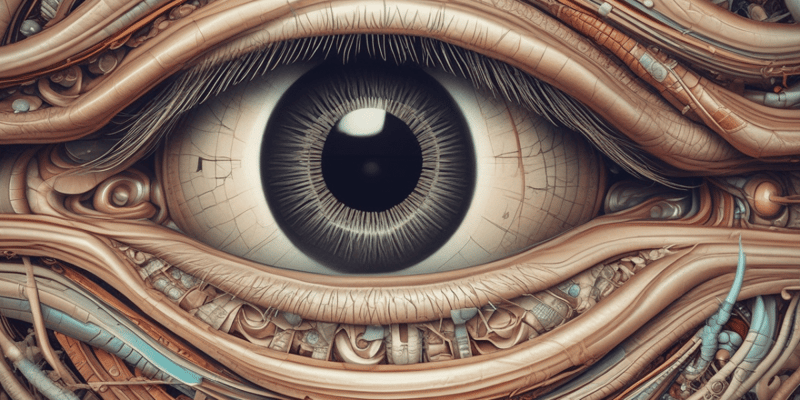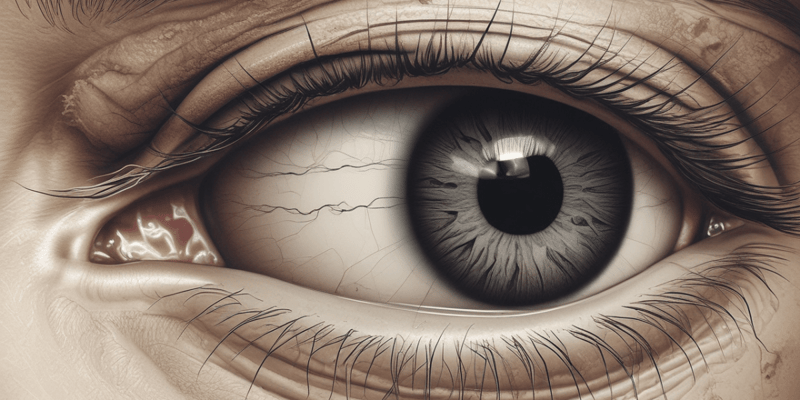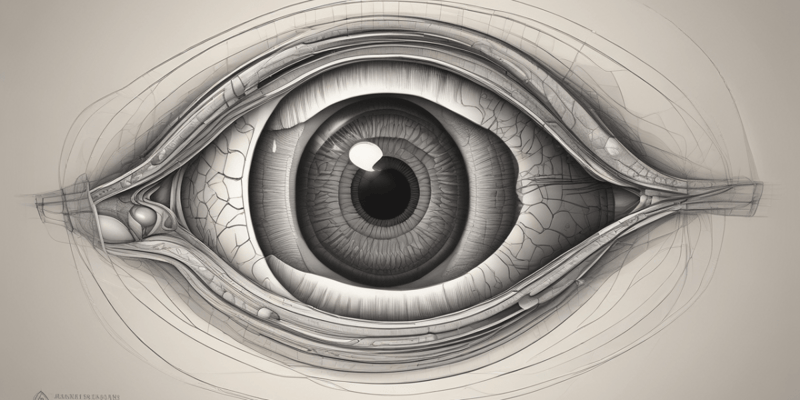Podcast
Questions and Answers
The Cornea is the structure of the eyeball that contains cell bodies of rods and cones.
False
The Ganglion Cell Layer is the 6th layer of the Neural Retina.
False
The Inner Nuclear Layer contains the cell bodies of bipolar, amacrine, and horizontal cells.
True
The Aqueous and Vitreous Humour are structures of the eyeball that transmit light.
Signup and view all the answers
Bipolar cells are 2nd order neuron cells in the visual pathway.
Signup and view all the answers
The visual field corresponds to the image formed on the retina.
Signup and view all the answers
Binocular vision refers to the ability to see with one eye only.
Signup and view all the answers
The optic nerve is formed by the convergence of cell bodies in the Inner Nuclear Layer.
Signup and view all the answers
The Neural Retina is the outermost layer of the eyeball.
Signup and view all the answers
Lesion F is characterized by a Contralateral Homonymous Lower Quadrantic Anopsia.
Signup and view all the answers
The lowermost fibers of the optic radiations end at the lingual gyrus, which is responsible for the lower to upper reversal.
Signup and view all the answers
Lesion G is characterized by a Contralateral Homonymous Hemianopia with Peripheral Sparing.
Signup and view all the answers
The supranuclear level is located at the pons.
Signup and view all the answers
The macular region has a collateral vascular supply, which is responsible for its preservation in Lesion G.
Signup and view all the answers
The frontal eye field is involved in smooth pursuit system.
Signup and view all the answers
The direct light reflex occurs in the unstimulated eye.
Signup and view all the answers
The optic radiations pass through the loop of Meyer on both sides.
Signup and view all the answers
The pontine gaze center is involved in vertical gaze.
Signup and view all the answers
The medial longitudinal fasciculus controls and coordinates eye movements.
Signup and view all the answers
A lesion of the lingual gyrus can cause a Contralateral Homonymous Hemianopia with Macular Sparing.
Signup and view all the answers
Yoke muscles are involved in disconjugate movement.
Signup and view all the answers
The large macular representation in the occipital cortex is responsible for the preservation of the visual field of the maculae.
Signup and view all the answers
Lesion G can occur following strokes involving the visual cortex.
Signup and view all the answers
The occipital gaze center is located in BA 8.
Signup and view all the answers
The nucleus of the nerves (CN III, IV, VI) innervating the muscles is located in the infranuclear level.
Signup and view all the answers
The Rostral Internucleus of MLF is involved in lateral gaze.
Signup and view all the answers
The medial longitudinal fasciculus extends from the posterior commissure to the upper cervical levels.
Signup and view all the answers
The ABDUCENS NERVE (CN VI) is located at the roof of the 4th ventricle, in the pontomedullary junction.
Signup and view all the answers
The B.COMMAND CENTERS are responsible for controlling the movement of the head.
Signup and view all the answers
The ANATOMY Optic & Extraocular Motor Pathways involve 5 levels: Supranuclear, Nuclear, Infranuclear, and two more.
Signup and view all the answers
The HORIZONTAL SACCADE system is responsible for vertical eye movement.
Signup and view all the answers
The VESTIBULOOCULAR REFLEX (VOR) is responsible for head rotation and balance.
Signup and view all the answers
The VESTIBULOOCULAR REFLEX (VOR) involves the ABducens nerve (CN VI) only.
Signup and view all the answers
During the VESTIBULOOCULAR REFLEX (VOR), the eyes rotate in the same direction as the head.
Signup and view all the answers
The MLF is involved in the SACCADIC SYSTEM pathway.
Signup and view all the answers
The PPRF is located in the cerebral hemispheres.
Signup and view all the answers
The left superior rectus and right inferior oblique muscles are yoke muscles.
Signup and view all the answers
The optic disc is the structure that produces a blind spot in the visual field.
Signup and view all the answers
An Argyll Robertson pupil does not react to light but reacts to accommodation.
Signup and view all the answers
The vestibulo-ocular reflex is responsible for ocular adjustment in response to head movement.
Signup and view all the answers
A lesion of the left optic nerve would result in total blindness of the right eye.
Signup and view all the answers
Axons of the optic tract terminate in the pretectal area.
Signup and view all the answers
Visual impulses in the accommodation reflex pathway initially receive in Brodmann area 19.
Signup and view all the answers
The Doll's eye maneuver is a reflex that involves the movement of the eyes in response to head movement.
Signup and view all the answers
The lateral geniculate body is a structure that receives axons from the optic tract.
Signup and view all the answers




